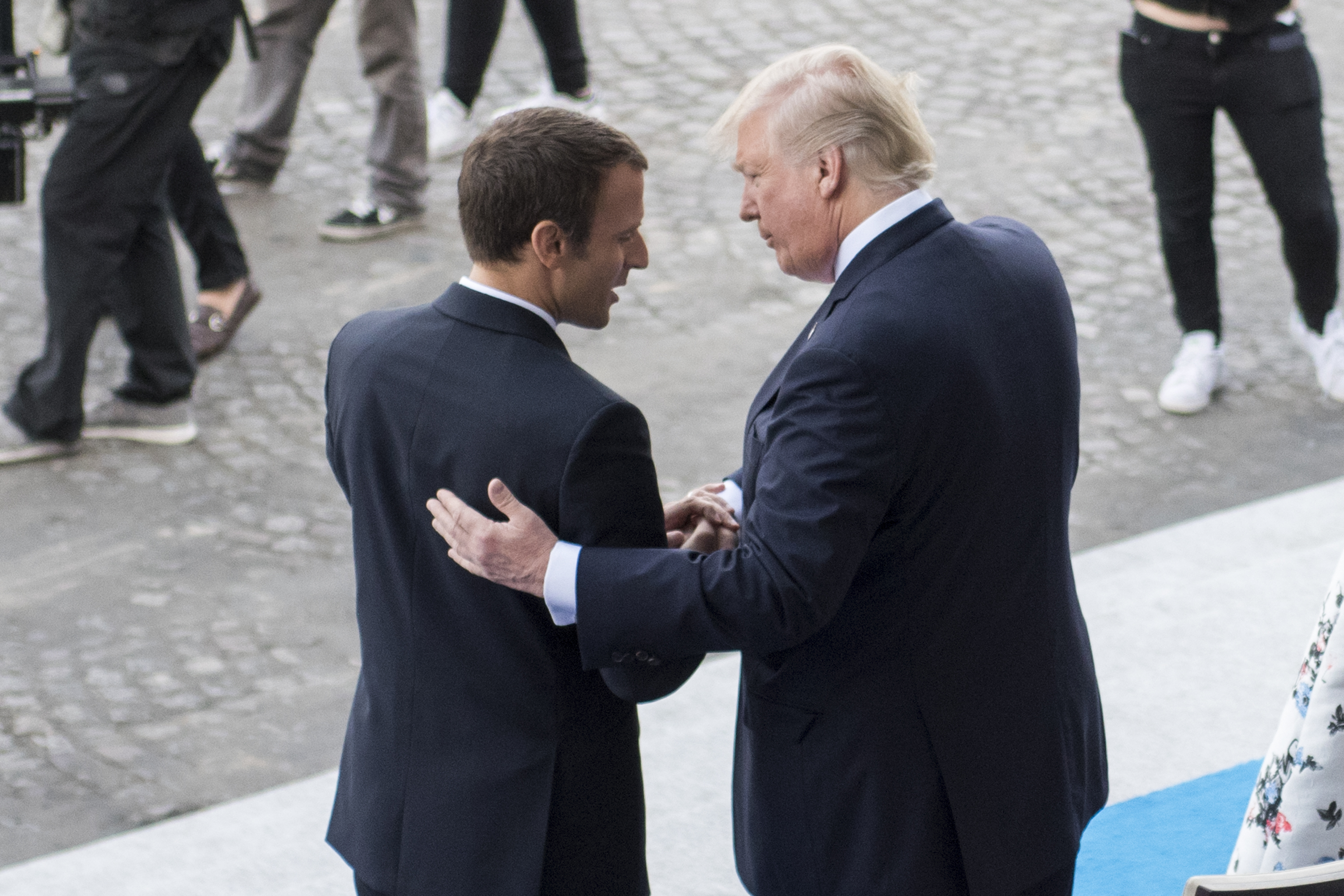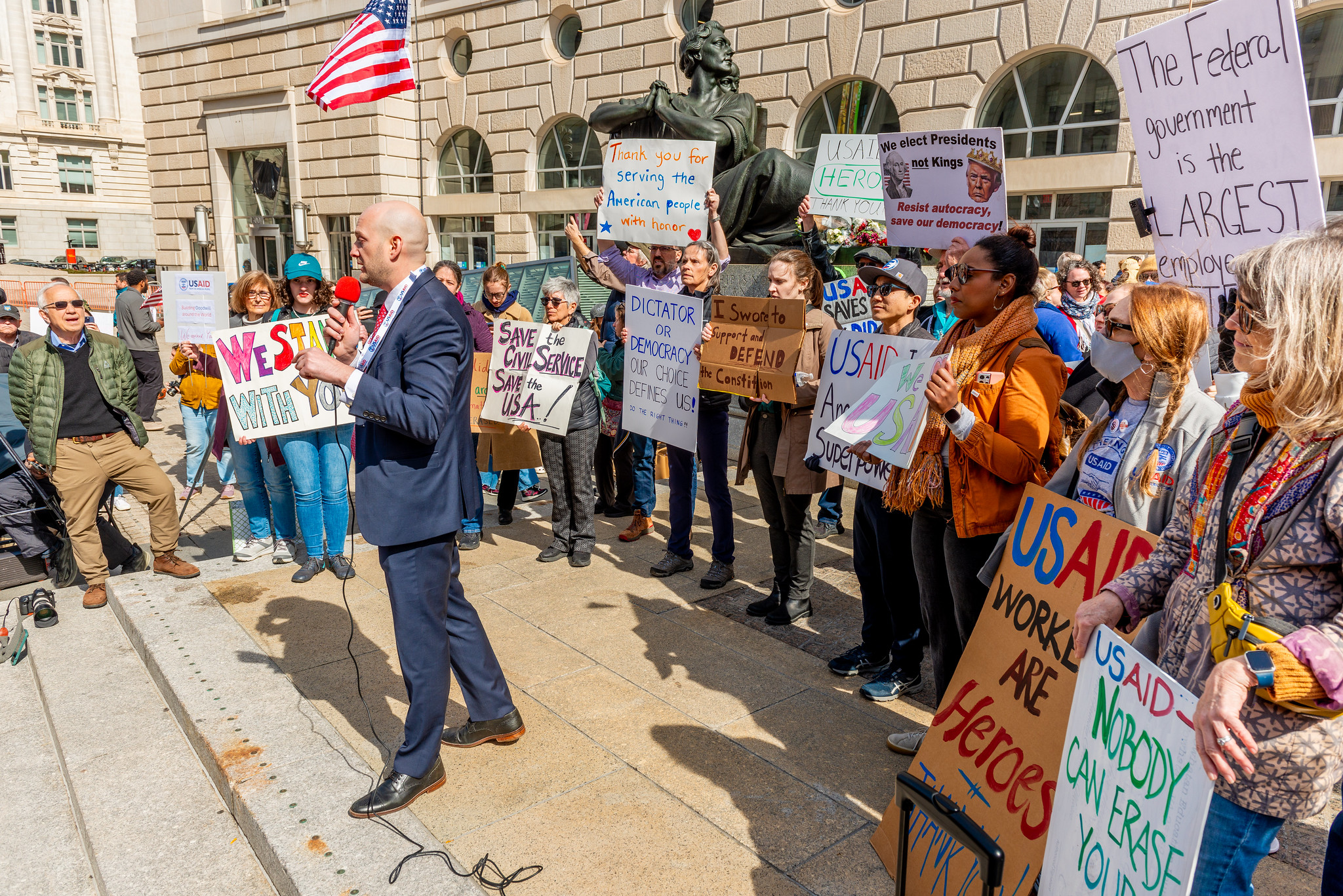Macron’s G-7 Gambit: Tame Trump, Save One Amazon, and Tax the Other
Editor’s Note: The article originally appeared on Order from Chaos.

Published by The Lawfare Institute
in Cooperation With

Editor’s Note: The article originally appeared on Order from Chaos.
At 44 years old, the Group of Seven (G-7) is going through a midlife crisis. Leaders of major economies now meet in the G-20 format, which questions the relevance of the smaller group. If anything, the G-7 should be a place for like-minded democratic powers to cooperate closely, and yet, deep ideological differences now limit consensus. The United States under Trump is particularly problematic. At last year’s G-7 in Charlevoix, President Trump refused to endorse the final summit communique and ripped harshly into his Canadian host Justin Trudeau.
Determined to avoid a similar showdown at this year’s G-7 summit in Biarritz, French diplomats worked hard to mitigate Trump’s hostility, defuse sovereigntist impulses, and obtain concrete outcomes. As the summit wrapped up on Monday, it appears that, with a bit of luck and some creativity, France might have found the right formula: offer Trump what he wants (the prospect of a beautiful deal), and offer the people what they want (save one Amazon and tax the other). Shifting away from the traditional communique—opting instead for a shorter “declaration”—also allowed for in-depth discussions among leaders unconstrained by the need to reach consensus statements on complex issues. Biarritz had the spirit of the original G-7—informal and brutal conversations among world leaders, with all the trickery and audacity realpolitik demands. It also had its limits: power games can easily destroy technocratic achievements.
French President Emmanuel Macron’s boldest diplomatic coup during the summit was the impromptu visit of Iranian Foreign Minister Javad Zarif, who participated in a briefing with the British and the Germans. It struck just the right chords, reducing tensions with Iran and showcasing the unity of Europeans on the Iran nuclear deal even as Brexit hardliner Boris Johnson took office as the British prime minister. Although the visit came as a surprise to all, it built on months of personal involvement by the French president on the issue. Ever since he took office, Macron has worked to convince both sides to keep the door open to negotiations, cajoling President Trump while pushing for measures such as INSTEX to keep Iran interested. At the beginning of summer, Macron thought he was getting closer to a breakthrough. Tensions in the Strait of Hormuz set back his effort, but France seized upon the relative torpor of August to bring Zarif to the G-7.
The gamble paid off. What’s remarkable is what didn’t happen: instead of perceiving the French president’s initiative as an ambush, President Trump quietly approved it. It wasn’t met with verbal aggression or a barrage of angry tweets, reflecting the legitimacy that Trump now confers on Macron as a mediator on this topic. In the final press conference, the French president relished in the privilege to announce a potential summit between Trump and Iranian President Hassan Rouhani—even announcing he would attend the summit if it ever happens. For his part, Trump said it was realistic to think that the summit could happen within weeks.
Macron also mobilized his fellow world leaders in the fight against fires raging in the Amazon rainforest, in the face of Brazil’s apparent passivity. France had pushed environmental issues onto the agenda of the Biarritz G-7. A session was dedicated to climate, oceans, and biodiversity and included world leaders who are not part of the G-7, such as India’s Prime Minister Narendra Modi. In addition to the signature of a biodiversity charter, a package of aid of 20 million euros for fighting Amazon fires was negotiated with the help of Chilean President Sebastián Piñera, and 30 million more will be discussed soon for reforestation aid. This sum is desperately small—a project as vast as caring for our green lung will require billions—and Brazilian President Jair Bolsonaro rejected it, stating that his country was not a colony. But for Macron, it is timely. After Greens outperformed expectations in May’s European Parliament elections, in France in particular, Macron has embraced environmentalism with the fervor of the convert. “I have changed” is his explanation for a newfound political purpose. It’s not just a belated epiphany—he will need these voters for his re-election in 2022. Putting out Amazon fires and clashing with Brazil’s far-right president cannot hurt his electoral chances.
Coming out of a year of Gilets Jaunes (yellow vests) protests which damaged his image both at home and abroad, Macron is keen on fighting his image as a globalist “president of the rich.” Part of his plan for a more just globalization has consisted in pushing for an international tax on large American tech companies like Google, Apple, Facebook, and Amazon. As a start, his parliamentary majority approved a 3% tax on revenues generated by the tech companies in France, infuriating Trump, who threatened retaliatory tariffs on French wine. In Biarritz, the U.S. accepted the principle of a discussion on international taxation of digital revenues at the OECD in 2020, in exchange for Macron’s promise to suspend the French tax when an international one is in place. In effect, Macron ceded little on this topic and gained a lot—he can legitimately claim success.
If Macron’s diplomatic audacity largely worked, there are vast areas of geopolitical concerns where more could have been done. G-7 members discussed problem spots (Libya, Ukraine, North Korea, Hong Kong) as well as reform of the WTO, but fell short of putting forward a coherent China strategy, or coordinating on averting a global recession. What Biarritz best demonstrates is that allies have by now learned to tread lightly with President Trump, which helps to keep the appearance of congeniality but does not guarantee lasting achievements. The glimmers of breakthroughs from this G-7 (on Iran, on cyber taxation, on trade) could vanish as fast as they have appeared.
President Macron also confused his counterparts with his reported endorsement of Trump’s idea that Russia should be allowed back in the group, of which it was a member for a decade and a half before the annexation of Crimea. Was his ambiguity the price tag for a benevolent Trump in Biarritz? The French president has since then reiterated pre-conditions for Russia re-entry in the club, while adding that avenues of discussion with Russia must be found. Yet, although Trump, and Italy, might hope for Vladimir Putin to join the G-7 in Miami next year, it would surely be preferable to focus on making the G-7 relevant, i.e. a place for meaningful coordination of sizable wealthy democracies. That is itself no small task—audacity will only take you so far.





